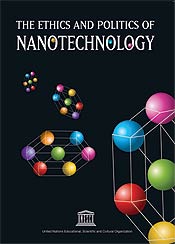| Nanotechnology, policy | |
The ethics and politics of nanotechnology8 August 2006
Chapters cover the current status of nanotechnology and where nanotechnology will intersect with existing policy issues and ethical dilemmas. It assesses the top ten applications of nanotechnology and lists their relationship to the UN Millennium Development Goals (MDGs). The report says that the most pressing current issues are toxicity and exposure to humans and the environment. This produces ethical issues due to the new forms of hazard or exposure risks, which create new questions about how to deal with them. Current means of risk assessment do "not address any wider issues of the ethical or political meaning of this risk — such as who will bear it, how it will be distributed internationally, and who will be given the power to make decisions based on these analyses." It covers measures in the EU and the USA to deal with safety aspects and lists the twelve recommendations from from the European Commission’s Consumer Protectorate Directive. Under ethical issues, the report highlights the potential use and abuse
of scientific information by governments and organisations. It sees the
over-liberal granting of patents as a current problem "which can curtail
even the most innocuous basic research by introducing A short section covers "ethical issues that aren't" such as the "grey
goo" scare of recent years. The report urges policy-makers, elected and
appointed officials, non-governmental and advocacy organizations to look
beyond these distractions and concentrate on the most pressing issues, which
include potential hazards, consumer The report can be downloaded (as a PDF file) from: http://unesdoc.unesco.org/images/0014/001459/145951e.pdf
|
 Paris,
France. UNESCO has published a report that assesses the ethical, legal and
political aspects of nanotechnology. It attempts to separate the realistic
potential of nanotechnology from some of the more fanciful headline-grabbing
claims. It outlines what the science of nanotechnology is, and presents some
of the issues facing the international community in the near future.
Paris,
France. UNESCO has published a report that assesses the ethical, legal and
political aspects of nanotechnology. It attempts to separate the realistic
potential of nanotechnology from some of the more fanciful headline-grabbing
claims. It outlines what the science of nanotechnology is, and presents some
of the issues facing the international community in the near future.